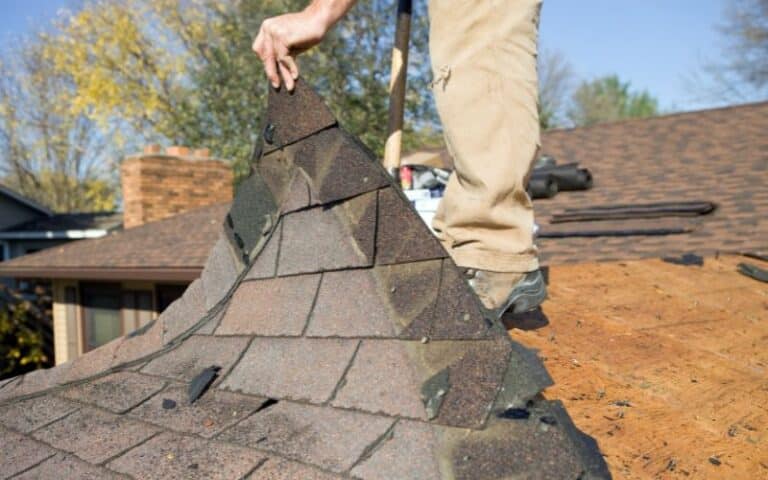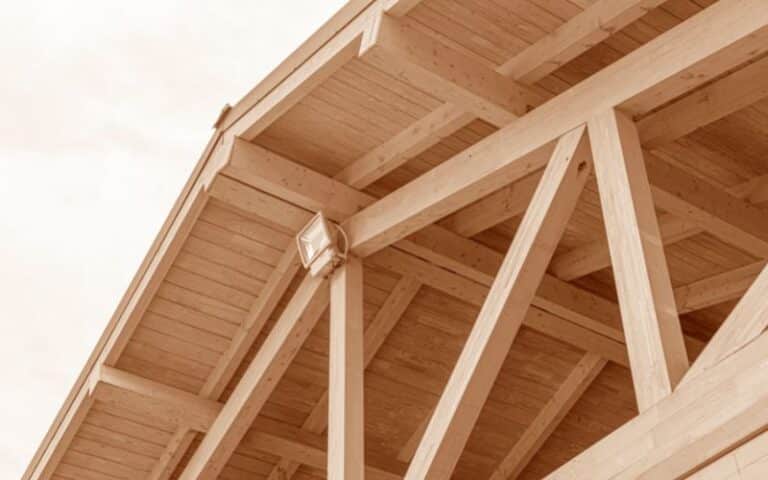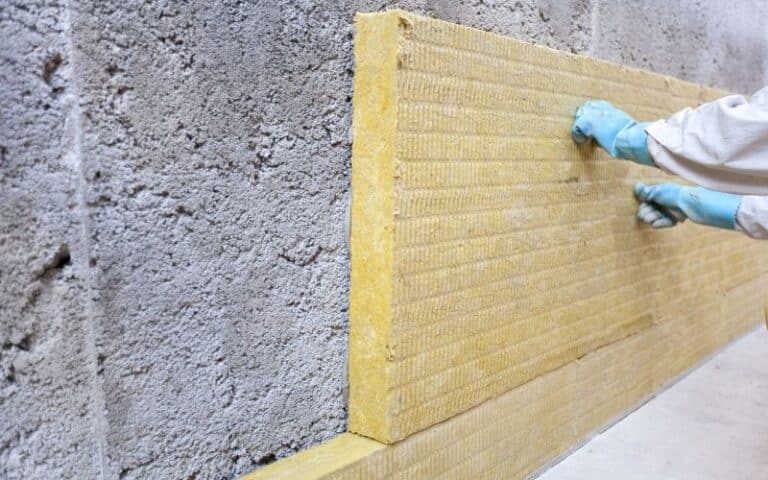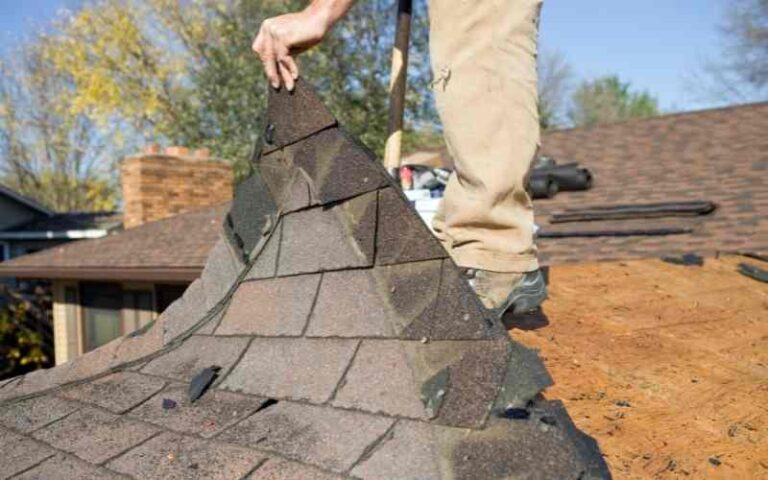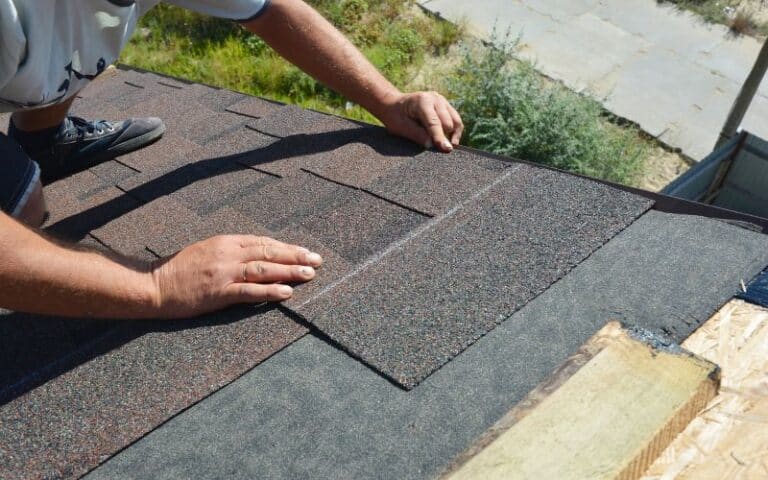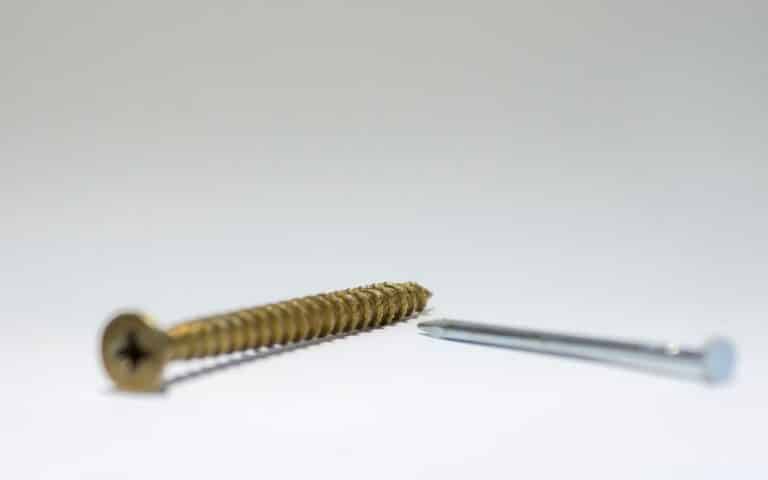Solar systems are super beneficial to households. However, just like many other house properties, you must consider some important things before installing them in your buildings.
For instance, you must understand their resilience to adverse weather conditions and how these objects affect other items.
And this brings up this question; can solar panels be blown off roofs?
Yes, solar panels can be blown off roofs. However, this rarely happens. Solar panels don’t just disengage from the roof of your building. However, if this happens, it’s probably because the roof is weakened on its own, and it’s not strong enough to hold the weight of the panels.
Ready for a Roofing Quiz?
Can Solar Panels Be Blown Off Roof?
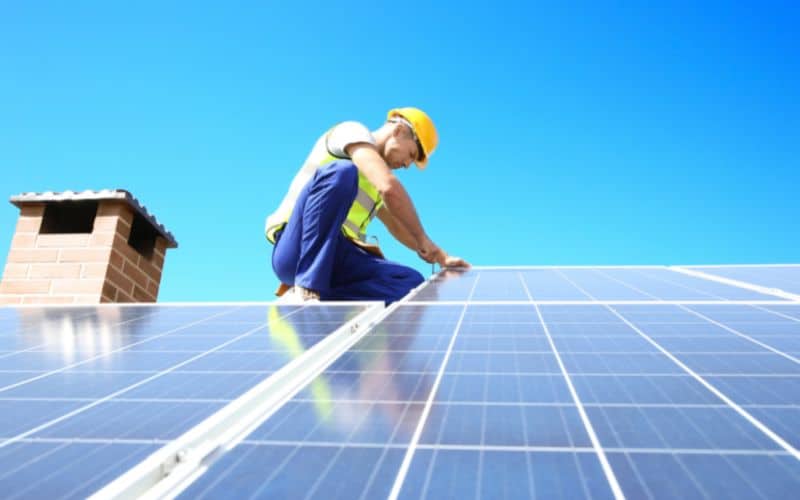
Yes, solar panels can be blown off your roof, but the possibility is very low. Two main things can cause your solar panels to blow off from the roof, and they are:
#1. Poor Installation
Out of the two main causes, poor installation is the one that can most likely cause your solar panels to blow off.
Therefore, ensure that you don’t install the solar panels yourself except if you’re an expert.
Seek the service of a professional installer when installing solar panels on your roof. The installer will ensure that the panels are installed to code, which makes the panels safe.
#2. Extreme Wind
The extreme wind is another cause of blown-off solar panels. Though solar panels are designed to withstand extreme weather conditions such as wind, they can lead to unwanted happenings if the wind is too violent.
A violent wind capable of uprooting a big and deep-rooted tree, tearing a whole house down, can also blow off a solar panel.
Although such a wind barely surfaces, the fact that it happens can’t be left unaddressed.
How Much Wind Can Solar Panels Withstand?
All solar panels are designed to withstand severe weather conditions regardless of size, weight, shape, and brand.
So generally, solar panels can withstand a wind resistance of 140mph. All you need to do is ensure that an expert installs your panels for you.
This is advisable to prevent your solar panels from blowing off unnecessarily. Moreover, ensure that you check the condition of your roof before proceeding with the installation.
This is essential as it helps you realize on time if there’s any issue with the roof because if the solar panels outweigh the roof’s capacity, it will cause the whole roof, together with solar panels, to get removed from your building.
Are Solar Panels Safe In Storms?
Yes, solar panels are safe in storms, but this situation isn’t guaranteed to a large extent. A chaotic storm can blow off a whole building; if such can happen, your solar panels can’t be safe either.
Well, the fate of your solar panels in storms depends on how severe the storm is.
But, to some extent, solar panels are durable and can withstand weather conditions such as snow, non-violent windstorms, and so on.
Moreover, whether your solar panels are safe depends on how you install them.
Even ordinary wind can blow off a solar panel that’s not installed properly, not to mention a storm. So make sure a professional installer does the work for you.
However, some environments experience violent storms frequently. In such areas, the safety of your solar panels can’t be guaranteed, but you can do some things to protect them.
Should You Put Solar Panels On Your Roof?
If you’re among the people who fear or think that installing solar panels on your roof will cause your roof or the solar panels to damage, then it’s high time you let go of that thought.
Solar panels cause no defect to the look of your house. More so, installing solar panels on your roof causes no damage to the roof, though there are some things you must do before the installation.
Before proceeding with the installation, reach out to a professional builder first to inspect if the roof is in good condition to hold up the weight of the solar panels.
This is important because solar panels are heavy on their own, and if the roof is weak, it can easily collapse due to the solar panel’s weight.
After the inspection, you can then proceed with the solar panel installation. But, again, don’t install the panels yourself, do well to reach out to a professional installer.
Meanwhile, apart from mounting your solar panels on the roof, another common method people adopt is ground mounting.
Check the table below to learn about roof-mounted and ground-mounted solar panels.
| Roof-Mounted Solar Panels | Ground-mounted Solar Panels |
|---|---|
| More exposed to direct sunlight. | They were obstructed from direct sunlight, sometimes. |
| Roof-mounted solar panels make use of free and unused space. | Ground-mounted solar panels use ground space that can be useful for other important things. |
| Solar panels on the roof are easier, cheaper, and faster to install. | Ground-mounted solar panels are more difficult, expensive, and require more installation time. |
| Maintenance and repair aren’t easy because you must always climb the roof. | There’s easy access to ground-mounted solar panels, thereby enhancing maintenance. |
| Some believe roof-mounted solar panels change the look of their building. | Ground-mounted solar panels have nothing to do with the look of buildings. |
| The roof size can greatly restrict your choice of solar panels. | There’s enough space for you to purchase any solar size you want. |
Therefore, both roof-mounted and ground-mounted solar panels have features that are peculiar to them. However, both of them work perfectly if installed properly.
How Do You Protect Solar Panels During a Storm?
If you live in an area that experiences storms often, there are some ways to protect your solar panels from getting damaged, and they include;
#1. Apply Methacrylate
Methacrylate is a thermoplastic organic polymer material applied on the surface of solar panels to prevent them from harsh weather conditions such as rain, wind, snow, hailstorms, etc.
Meanwhile, methacrylate is more effective against hail storms than other weather events.
Methacrylate performs the same function as the screen guide of your phone. Methacrylate is transparent, allowing your solar panels to be exposed to sunlight.
First, though, you must apply it appropriately. The methacrylate layer must neither be too thin nor too thick and should be in-between.
#2. Use Protective Covers
A protective cover is mostly used for cars to protect them from severe weather conditions. So, just like in cars, you can also use it to protect your solar panels.
Though it’s only a cover made with clothing material, it can be blown off if there is violent wind. Therefore, a protective cover is not very effective against the severe wind.
#3. Monitor the Weather Forecast
Another way to protect your solar panels from the effects of storms is by paying close attention to the weather forecast.
You can use an app to monitor the weather events in your area even before they happen. By monitoring the weather, you’re being proactive, which will help you prepare against the storms.
Also, some solar panels can be easily moved due to their sizes. So, if your solar panel is of small size, you can move it inside before the storm.
#4. Cut Down Trees
If there is any tree around your solar panels, consider cutting them down. Trees are sources of breeze on their own and simultaneously work with storms.
However, you can control the storm to some extent if you cut down the trees around your house.
#5. Buy the Right Panels
Purchasing the right solar panels is one of the best ways to protect your solar panels from storms. Seek the assistance of a professional installer before buying your solar panels.
The installer will help you inspect your building codes, the location of your building, the wind speed that any solar panel installed in your area should withstand, and so on.
#6. Proper Maintenance
Like other home properties, your solar panels also require adequate maintenance.
Inspect your solar panels from time to time, this will help you discover if the panels have any issues, and you will be able to solve the problem on time.
By giving your solar panels proper maintenance, you will discover any part loosening that can easily blow off if there is a storm.
#7. Apply For Insurance
Applying for insurance is another main means of protecting your solar panels. Make findings if the brand that manufactured your solar panels provides insurance for their customers.
Apply for the insurance and ensure that you register for the one that specifically covers damages from storms.
Conclusion
Install solar panels on your roof does not harm the roof and your building. The most important precaution you need to follow when installing solar panels is to ensure that the panels are properly installed.
If the solar panels are installed professionally, other things will surely be under control.

